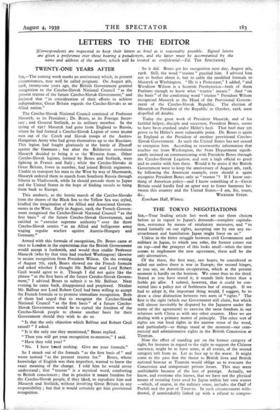LETTERS TO THE EDITOR
[Correspondents are requested to keep their letters as brief as is reasonably possible. Signed letters are given a preference over those bearing a pseudonym, and the latter must be accompanied by the name and address of the author, which will be treated as confidential.—Ed. THE SPECTATOR] TWENTY-ONE YEARS AFTER
Sur,—The coming week marks an anniversary which, in present circumstances, may well be called poignant. On August 9th, 1918, twenty-one years ago, the British Government granted recognition to the Czecho-Slovak National Council " as the present trustee of the future Czecho-Slovak Government," and declared that " in consideration of their efforts to achieve independence, Great Britain regards the Czecho-Slovaks as an Allied nation."
The Czecho-Slovak National Council consisted of Professor Masaryk, as its President ; Dr. Benes, as its Foreign Secre- tary ; and General Stefanik, as its military member. In the spring of 1917 Masaryk had gone from England to Russia, where he had formed a Czecho-Slovak Legion of some 9o,000 men out of the Czech and Slovak troops of the Austro- Hungarian Army who had given themselves up to the Russians. This legion had fought gloriously at the battle of Zboroff against the Germans ; but after the Bolshevist revolution Masaryk decided to bring it to the Western front. Other Czecho-Slovak legions, formed by Benes and Stefinik, were fighting in France and Italy ; while the Czecho-Slovaks in Great Britain, fewer in number, had joined British regiments. Unable to transport his men to the West by way of Murmansk, Masaryk ordered them to march from Southern Russia through Siberia to Vladivostok, while he should precede them to Japan and the United States in the hope of finding vessels to bring them back to Europe.
This anabasis, as the heroic march of the Czecho-Slovaks from the shores of the Black Sea to the Yellow Sea was styled, kindled the imagination of the Allied and Associated Govern- ments in the West. Early in August, 1918, the French Govern- ment recognised the Czecho-Slovak National Council "as the first basis " of the future Czecho-Slovak Government, and entitled to " exercise supreme authority " over the three Czecho-Slovak armies "as an Allied and belligerent army waging regular warfare against Austria-Hungary and Germany."
Armed with this formula of recognition,. Dr. Benes came at once to London in the expectatioosthat the British Government would accept it forthwith, and would thus enable Professor Masaryk (who by that time had reached Washington) likewise to secure recognition from President Wilson. On the evening of August 7th, 1918, Benes showed me the French formula and asked whether I thought Mr. Balfour and Lord Robert Cecil would agree to it. Though I did not quite like the phrase " as the first basis of the future Czecho-Slovak Govern- ment," I advised Benes to submit it to Mr. Balfour. Next evening he came back, disappointed and perplexed. Neither Mr. Balfour nor Lord Robert Cecil had been willing to accept the French formula or to promise immediate recognition. Both of them had urged that to recognise the Czecho-Slovak National Council " as the first basis " of a future Czecho- Slovak Government would be to curtail the freedom of the Czecho-Slovak people to choose another basis for their Government should they wish to do so.
" Is that the only objection which Balfour and Robert Cecil raised? " I asked.
" It is the only one they mentioned," Benes replied.
" Then you will get your recognition to-morrow," I said.
" Have they told you? "
" No. I have heard nothing. Give me your formula."
So I struck out of the formula " as the first basis of " and wrote instead " as the present trustee for." Benes, whose knowledge of English was then imperfect, wanted to know the exact meaning of the change. I told hint he would never understand ; that " trustee " is a mystical word, comforting to British consciences ; that in practice it meant freedom for the Czecho-Slovak people, if they liked, to repudiate him and Masaryk and Stefanik, without involving Great Britain in any responsibility ; but that it would certainly get him provisional recognition. So it did. Benes got his recognition next day, August 9th, 1918. Still, the word " trustee " puzzled him. I advised him not to bother about it, but to cable the modified formula to Masaryk at Washington. " He is a Protestant," I added, " and Woodrow Wilson is a Scottish Presbyterian—both of them Puritans enough to know what ' trustee' means." And " on the basis " of the comforting word " trustee " President Wilson recognised Masaryk as the Head of the Provisional Govern- ment of the Czecho-Slovak Republic. The election of Masaryk as President of the Republic in October, 1918, soon dispelled all doubts.
Today the great work of President Masaryk, and of his faithful helper, disciple and successor, President Benes, seems to have Iva) crushed under Hitler's heel. That heel may yet prove to be Hitler's most vulnerable point. Dr. Benes is again in England as the President of another provisional Czecho- Slovak Government. As such the United States has not ceased to recognise him. According to trustworthy information that reaches me from Washington, the State Department signifi- cantly insisted on communicating with President Benes through the Czecho-Slovak Legation. and sent a high official to greet and to confer with him there. Would it be amiss if the British Government were to keep the anniversary of August 9th, 1918, by following the American example, even should it again recognise President Benes only as " trustee "? If I know any- thing of American policy—and I know something of it—Great Britain could hardly find an apter way to foster harmony be- tween this country and the United States.—I am, Sir, yours,








































 Previous page
Previous page